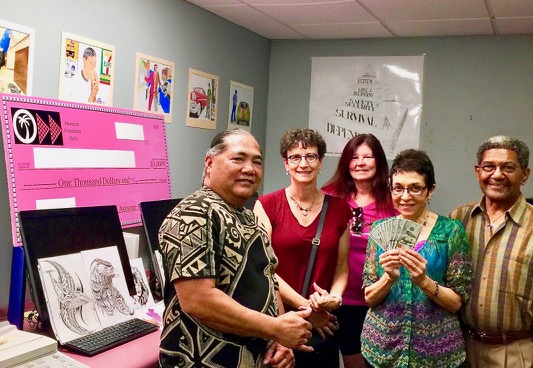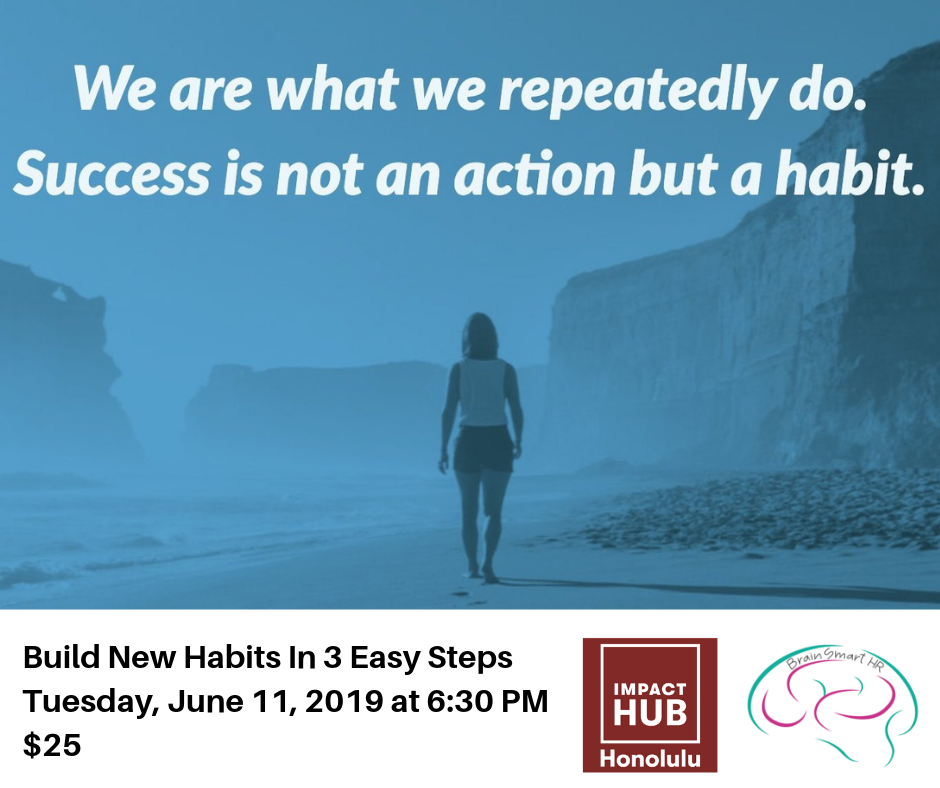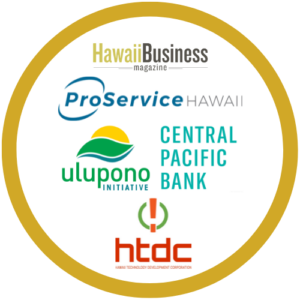Today we’re sharing a Host spotlight featuring Ruby Menon. You have likely seen her smiling face at our evening events and coworking during the day, or hosting her own events focused on building better habits – a key foundation for a life and business. In addition to leading events here, Ruby has a full-time day job and runs another very cool project – so I’m grateful she had the time to share her story with us.
What is your background and history – how did you get into your current role?
I am what you call a polymath – I am very curious and love learning new things. When I lived in San Francisco, I went to art school, was a musician, and worked in the health food industry as a cashier, bookkeeper, and a buyer. When I moved to Hawaii I branched out as a trainer, event planner, project manager, and worked in HR management in the non-profit, healthcare, and technology industries. I recently made a career transition from HR and am now working in the startup technology world as a software development product/project manager. I also have my own business, BrainSmart Behavior Design, to teach people how to achieve their goals by building better habits.
I have several side interests in human behavior, social justice, workforce development, art, and technology that have led me to many interesting projects. I used my workforce development background to co-design a vocational profile for people who were transitioning from prison to the community. I hired a developer to transition the profile from a pen and paper format to its current online version. To handle my learning curve, I took a deep dive into software development and product design. That’s when I realized I really enjoyed the process of taking an idea and bringing it to life through software development. I took classes in coding, UX design, design thinking, agile and lean methodology. Through trial by fire, I learned how to work with developers to get the product to market. That experience brought me to my current role as a product/project manager for an early stage startup.
What is the focus on your side project Inmate Art CARE Project and what was your most recent big win?
The Correctional Arts ReEntry (CARE) Project is an inmate art social enterprise program designed by WorkNet, a non-profit that provides reentry services for inmates transitioning to the community. The CARE project markets and sells the artwork of incarcerated artists so they can earn money for their reentry to the community.
In January 2016, we launched the CARE Project at the Women’s prison in Kailua (WCCC). The program is still active today and has become very popular with the WCCC women because they can earn money and have a therapeutic outlet. When their art sells, proceeds are split between the inmate artist and WorkNet to help us continue the program. We also developed a partnership with the Nā Mea Gallery at Ward Center that sells original cards designed by one of our community artists on consignment.
Most recently we were accepted in the Purple Prize accelerator and received a $1000 grant from the Awesome Foundation.

How does this work speak to you/how did you get involved with this?
I became interested in inmate art because my husband is WorkNet’s Executive Director, the non-profit that is sponsoring the CARE project. WorkNet provides inmates community reentry services such as helping them find a job, getting their identification documents, getting a driver’s license, and finding housing.
In his prison work, he discovered that there are many talented artists that are incarcerated. One day at the kitchen table, we hatched an idea to help these artists market and sell their art so they can earn money for their transition to the community. We came up with a name for the program and secured seed funding so that I could prototype the program. With that funding, I was able to launch the pilot project at the women’s prison, WCCC. That program is still active today. Although I am not involved in the daily operations, I still work on partnerships, grant writing, and marketing the project.
What we found with the CARE project is that inmate art is a vehicle that can help to break down biases and stereotypes about people in prison. People who buy the artwork see an artist instead of an inmate locked up in prison. We enhance this experience by having each artist write a short bio about themselves and their artwork so that their stories of resilience, redemption, and hope can be heard. The ultimate goal is to create an understanding and awareness that those in prison are worthy of our compassion and should not be discarded by society. Doing so is a waste of human potential and talent as these artists fully demonstrate.
You’ve facilitated multiple events here focused on Tiny Habits, a habit-building structure that you’ve been specifically trained to do. Why does this habit-building work for you and how can it benefit other members?
I love studying human behavior. This interest has led me to delve into the fields of behavioral science, behavioral economics, neuroscience, and psychology. Last year, I started studying with Stanford professor, Dr. BJ Fogg, a behavior scientist and founder of the Behavior Design Lab at Stanford. I became certified in his Tiny Habits® methodology. BJ also lives 6 months out of the year in Maui so he and I started collaborating on ways he could become a resource for our innovation community in Hawaii. Fast forward to today, I became the community manager for our online Tiny Habits coaching community and absolutely love supporting all our awesome coaches. BJ just finished writing his book on Tiny Habits® which will be released in early 2020.
I don’t think people realize how habits form such a critical part of our daily lives. The first book I read called the “Power of Habits” by Charles Duhigg inspired me to learn more about the topic. What I found lacking in the literature was practical “how” steps to changing habits. My AHA moment came when I discovered BJ’s work with Tiny Habits. After I learned his method, I saw tremendous results in my productivity and ability to accomplish my goals. Now I have been teaching the method in my Habit design classes at the Hub for the general public and our members.
My next master class will be on June 11 at 6:30 pm. I will be teaching the Tiny Habits method, which teaches you a 3-step process that you will be able to implement right away to build new habits and make progress in any area of your life.


